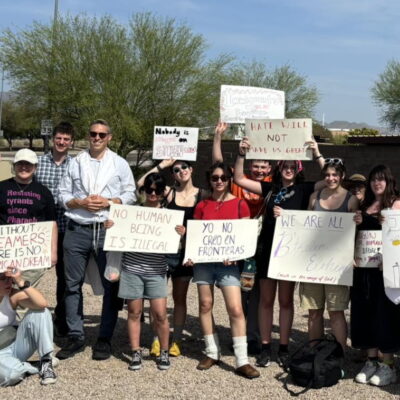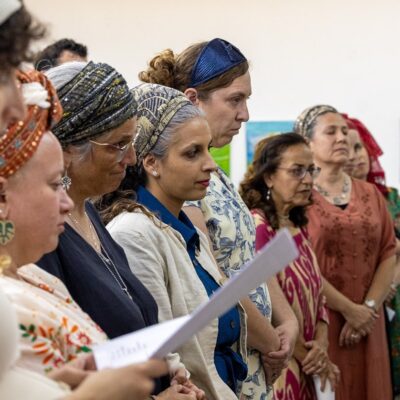‘Pay for Success’
Israel’s SFI Group looks to boost ‘catastrophic’ math studies in Bedouin community with results-based funding model
Under the compensation method, the nonprofit — and its funders — gets more money the better students perform

Courtesy/SFI Group
High school students who are part of SFI Group's Momentum program study math in Rahat, in an undated photograph.
Do the math. That could be the mantra of an unconventional results-based funding model that Israel’s SFI Group is using to address what one Israeli education expert referred to as a “catastrophic” situation in the school system in the Israeli Bedouin community, which lags far behind the national average, particularly in mathematics.
And SFI Group is hoping the numbers add up: Its funding from the government will come — and its investors will be repaid, potentially with interest — only if more students excel in their math studies.
Building off a previous similar but smaller program, the nonprofit intends to launch projects in 19 high schools across four Bedouin-majority cities in southern Israel to increase the number of students in high-level math courses, relying on a “Pay for Success” model of funding from the Israeli government. Under this riskier but potentially more rewarding payment model, the compensation that SFI Group receives from the government depends on how successful the program is: the more students study high-level math, the more SFI Group and its investors get paid. But if SFI Group does not meet its benchmarks, it does not receive funding.
This method represents a break from traditional government funding practices, in which a government office puts out a tender at a fixed rate, which is paid on the front end. “The government wants to do a social project, it puts out a tender, chooses a winner, pays the money and hopes for the best. And when there are results, there’s no connection between the results and the payment,” Yaron Neudorfer, SFI Group co-founder and CEO, told eJewishPhilanthropy. “[Pay for Success] ties social outcomes to the payment.”
This mechanism — pioneered in the United Kingdom by Sir Ronald Cohen, who is also a co-founder of SFI Group — was previously referred to as a social finance bond, but this was changed as it was found to be misleading — the “bond” in the name is not a financial bond but the connection between the social and the financial.
In 2019, SFI Group — started as Social Finance Israel in 2013 before joining with two other nonprofit, Midot and Nova, in 2020 and 2022, respectively — raised some NIS 14.8 million ($4.2 million) for its Momentum project with Israel’s Education Ministry and the STEM education nonprofit Beit Yatziv. The funding came from a variety of individual investors, including former tech executive Eyal Waldman; philanthropic funds, such as the Rashi Foundation; and Israel’s Bank Mizrahi-Tefahot, among others, according to the organization.

The goal of the first Momentum project was to increase the number of students in grades 10-12 in Rahat studying four and five units of math — based on the Israeli education system, which ranks national high school competency bagrut tests from one to five units.
Neudorfer compared the organization’s efforts with the nonprofit Beit Yatziv, which worked directly with the students, to private equity. “In private equity, you buy a company, you make it better and you sell it. What we’re doing here is exactly that. We employed the project manager, the executing organization, and they do what they know how to do,” he said. “We bring in the additional dimensions of the project that [Beit Yatziv] is not familiar with.”
Vladi Yoffe, the performance manager for both Momentum projects, noted that much of this increase took place during the COVID-19 pandemic, when schools shifted to remote learning — a complicated prospect in the Bedouin Israeli community, which is both less likely to have access to home computers and to reliable internet. Based on the “Pay for Success” model, SFI Group still had to show results regardless of the pandemic or risk not receiving its compensation.
“In a normal program, they would have just called it off. Since we are committed to results, we didn’t have that option. We had to think outside of the box and decide how to proceed,” Yoffe told eJP. “We reached out to high-tech companies to get donations of laptops and tablets… We also got an exemption for these students to study in person in small groups.”
When the program launched in 2019, 14.1% of Bedouin Israeli students were in these high-level classes, compared to 34% of Israeli students overall. Four years later — after the first cohort of students — the amount in Rahat increased to 25%, still short of the national average of 37.8% but significantly higher than the average among Bedouin Israelis of 15.7%.
According to SFI Group, slightly over half — $2.15 million — of the initial $4.2 million investment has already been distributed to investors for the initial Momentum project based on the first cohort of students, with another $1.9 million expected to come shortly for the second cohort of students. Once the organization receives payment for the third cohort, the investors are “expected to receive their full investment along with a nice return from the Ministry of Education.”
Now, SFI Group is looking to launch a new Momentum program, which will be considerably larger, involving three more Bedouin-majority cities in the Negev — Hura, Segev Shalom and Arara in the Negev (as opposed to the town of Arara in northern Israel) — and growing the number of students from 270 students in each of the three cohorts to 600. For the new project, Momentum 2.0, the organization is looking to raise NIS 42.7 million ($12.1 million), which will make it SFI Group’s largest project to date.
According to Ismael Abu Saad, a professor in the School of Education at the Ben-Gurion University of the Negev, innovation in this area is desperately needed, though he said that he was not familiar with the details of the SFI Group program.
“The situation is catastrophic,” he said, directing eJP to recent research he performed for the Israel Democracy Institute showing Bedouin Israeli graduation rates to be far below those of Jewish Israelis, Arab Israelis and Druze Israelis by a significant margin.
Yoffe noted that the Bedouin Israeli community represents a sizable percentage of the population of southern Israel and by 2050 is on track to represent 50% of the population of the Negev. He added that the Bedouin community was particularly hard hit in the Oct. 7 attacks, with dozens of members killed and several taken hostage to Gaza, which he said further demonstrated the need to support the community or risk seeing it further alienated from Israel and drawn closer to its enemies.
“Everything that we can do with that community will have a positive influence on the entire society,” Yoffe said.
Yoffe told eJP that a challenge in working in education in the Bedouin community — or at least a fact of it — is that to be successful, SFI Group needs to work holistically, looking not only at schools but on broader social and economic issues. A school can have top-notch programming, but if a student can’t get to school because the roads around their house are flooded, it doesn’t matter.
“In Segev Shalom, for instance, many of the students come from unrecognized communities in the Negev,” he said, referring to encampments that do not have official approval from Israeli authorities, meaning they often don’t have electricity, running water, bomb shelters and other necessities. “On [psychologist Abraham] Maslow’s hierarchy of needs, they don’t have a firm foundation. So the work is more holistic and not just pedagogical.”

“Momentum 2.0 is not a study program. Math is just a tool for social mobility. In order to create social mobility, you need motivation. In order to create motivation, you need to build them a vision for the future,” he said.
In addition to operating in more cities, the new Momentum program will also work with ninth graders and the new compensation package with the Education Ministry will take into consideration not only if the students passed or failed the tests, as in Momentum 1, but their scores as well, which Yoffe said is a better indicator of future success.
According to Yoffe, the compensation package is built in a way that is meant to prevent SFI Group from being able to distort the results to make it appear as though it’s been more successful than it has by, for instance, expelling low performing students to raise the average. “You can’t kick out the weak students,” he said, noting that in the Israeli education system that is not a possibility. “We have to work with everyone, with the whole class. Obviously, we have to do some screenings, not everyone is capable of studying four or five units of math. That’s true [for everyone].”
Neudorfer, who has been looking to attract new investors for the initiative, will head to the United States next week to continue this effort, SFI Group said.
He acknowledges that the “Pay for Success” model is inherently limited by one of its defining characteristics, namely that it only works in areas that can be translated into quantifiable metrics. Areas that are more subjective or artistic are not a good fit for this field, for instance. “We have projects in health care, welfare, education and employment,” he said. “But not everything is measurable.”













